Cat Zingano has rarely been afraid. It's something for people who weren't the only girls on their high school wrestling team. For girls who didn't jump whenever dared. Those who didn't risk everything to achieve a dream.
Fear was for other people.
But last September, Zingano was afraid. Afraid she would never again be the athlete she was on the precipice of becoming after beating Miesha Tate to become the top challenger to then-UFC bantamweight queen Ronda Rousey. Before her knee exploded. Before, as people so euphemistically put it, "her loss."
Worse, she was afraid of the consequences that would accompany that success she had once craved so badly, for both her and her family. Zingano was afraid, sometimes, of the silences—and the dark thoughts that accompanied them.
Some things you can never forget. They're etched into your mind, the kind of memories that never fade. But white-sand beaches help. Melodic waves help. The absence, at least temporarily, of well-meaning friends with sadness in their eyes helps.
Two years after police discovered the body of her estranged husband, Mauricio, dead of a suicide at 37, Zingano and her son, Brayden, were on a beach, looking for a miracle and a new start. On January 13, 2014, that seemed impossible. But, somehow, they found what they sought 8,000 miles away from everything they knew and loved.
"Thailand was perfect. I was around the Buddhist culture and everyone there is happy," Zingano told Bleacher Report. "They have so little, but they're so grateful for everything they have. And the food was clean and the time I spent was all well used. And my son was happy and I was happy."
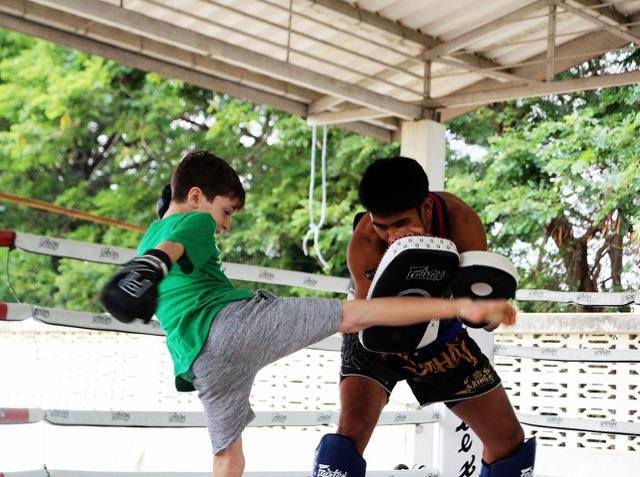
In Thailand no one knew her. They weren't the people spoken of in respectful whispers, subjects of darting, worried looks. No one knew about her injured knee, no one thought to take it a little easy, whether subconsciously or not. They were just two more anonymous Americans.
In Thailand, the Zinganos found themselves again by becoming no one at all.
"The anniversary came and went and we paid respects to it," Zingano said. "And we were able to be sad but unplugged. I just didn’t want to lay in bed in the dark of the winter. It was like, all right, let's get out and we're gonna go out to eat and we're gonna sit near some clean, beautiful sand and be around smiling, happy people that have no idea who we are.
"It was productive, you know, it was a step in the right direction as far as what I wanted the anniversary to be like versus just having to be so sad and confusing."
She and her son found peace in Thailand—they also found violence. Brayden had his first real Muay Thai experience in the land of the sport's origin. Cat reunited with an old coach, the legendary Sakmongkol Sithchuchok, a familiar face in a sea of strangers.
These were Zingano's first tentative steps back into the world of mixed martial arts. For the first time since her 14-second loss to Rousey back in 2015, for the first time since really processing the loss of her coach and partner, Zingano was thinking seriously about an Octagon return.
And, this time, against Julianna Pena at UFC 200, she was ready to fight for herself.
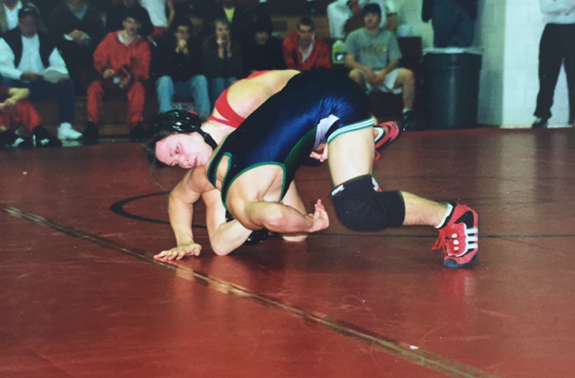
Leister Bowling was the toughest kid at Lyons High School in Boulder, Colorado. That didn't intimidate Cathilee Albert, who walked up to him in front of his friends and challenged him. As a three-time champion, he had something she wanted—wrestling knowledge. And she was willing to go through hell to get it.
In the wrestling room that day, Bowling cracked Albert's orbital bone, trying to get the future Cat Zingano to quit. He had no idea the force of nature he was dealing with.
"The message I got from it while he was just beating the crap out of me was, man, I have so much to work on," Zingano said with a laugh. "You know this should not be that easy for me to just be destroyed like this right now. In my head, while I'm getting the crap beat out of me, I'm taking mental notes.
"I didn’t realize what he was doing was trying to mentally and physically break me so I wouldn’t come back. I took it as, all right, if I want to be at the same level as this guy, then I need to find a way to learn how to be as good as him and to not let this kind of thing happen to me."
Zingano understood she was making the boys uncomfortable. But that wasn't about to stop her once her interest was piqued.
"It just kind of drove her to do it even more. When Leister hit her, that's the switch. Like 'Really? I'm going to prove you wrong. Everything in me wants to prove to you I belong.' And she did," childhood friend Bevin Mcleod said.
"She's always been a pioneer in that way, the kind of person to do things people tell her she can't do. As a girl, in an all-guys sport, people told her she couldn't do it. So she wanted to.
"I watched her all through high school and thought she was insane. But she was really committed to it. It was kind of par for the course of being friends with her. You were going to see her trying stuff that got her hurt. She's had so many injuries and surgeries. It didn't really stand out to me as anything more than normal Cathilee life."
In the end, Zingano won Bowling over and the two became lifelong friends. It was hard, after all, not to be impressed. Wrestling gave her purpose and, at 130 and 135 pounds, she turned plenty of heads in what had always been an all-boys club. Along the way, she built the competitive base that would serve her well when her adult life took the strange turn into professional fisticuffs.
"Wrestling was the hardest thing I've ever done," Zingano said. "I know what that feels like on the receiving end, so that’s what I try to do to people that I'm up against is mimic that feeling. But, because my opponents haven't gone through that or the majority of them haven't gone through that, they don’t know.
"I know the sounds they make when they're getting close to breaking. I know the ways that they breathe, I know the body mechanics of somebody that just wants out. Even when they don’t even realize it yet."

The pre-paid jiu jitsu lessons were purchased for her high school sweetheart. But the two had broken up and Cat didn't believe in letting things go to waste. That's how, in 2007, after years removed from the mats, Zingano found herself grappling again. It's also how, soon after, she found herself in love.
"Mauricio was so impressive. Strong and skilled and funny," Zingano remembered. "And jiu jitsu was something I could throw myself into just like I had with wrestling."
Her wrestling experience served her well in this new world. Trophies and tournament wins came. Later professional cage fights. All, she realizes now, to please him. Soon enough, the wins piled up.
"The girl just beat my ass. I had never had a swollen face and bruised-up body the way I did after that fight. I still haven't to this day," Invicta 125-pound champion Barb Honchak said. "Her strength, agility and ability to improvise and come up with things on the fly are amazing. She has such amazing body awareness from all her years of fighting and grappling she can pull off some incredible stuff.
"She does this suplex—I remember watching video of her before our fight doing that to Mauricio in practice and telling my coaches she would never do that to me. And then she did it and I was like 'dang.' And she's done it a couple of times in the Octagon since. She has this incredible athleticism that allows her to do stuff like that. Only a fraction of that can be taught."
Honchak found herself drawn into the Zinganos' orbit, training with Cat and her team during the day while sleeping on their couch at night.
"In the beginning it was good," Honchak said. "They were both happy and very much in love. And then things changed. I would go there and see changes in them. Cat went from being super happy, bubbly and playful to being visibly stressed and lethargic, almost to the point of being catatonic at times."
Zingano was still learning from her coach, who happened to be her husband. Many of the lessons were physical, including Mauricio cornering Cat in the boxing ring and pounding on her until she cried. He was teaching toughness and creating the kind of comfort with violence a fighter needs to succeed. But the dual hats, in time, began to wear on the couple.
"It's difficult. Because you have to look at your coach as sergeant or your boss," Honchak said. "Not as someone you can disagree with. And, when you go home, I want to crawl into bed and just be a person and be with my family. I don't want to be a fighter for those hours. That's a really hard thing to do when your coach is your family."
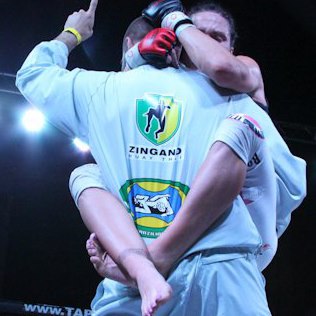
With Mauricio, the coaching never stopped. Not at dinner, not at night before bed. Not ever. And the results spoke for themselves, at least in his mind. Zingano, who quickly added diverse skills to her wrestling base, became one of the best women fighters in the world.
In April of 2013, an upset win over Tate stamped Zingano's ticket to the big time. The first mom to ever step foot in the UFC's Octagon earned a spot opposite Rousey on The Ultimate Fighter reality show, and an opportunity to fight for the world championship.
"It's much easier to beat up an assh--e," Zingano said of Tate, one of the few people who you can get her to say a bad word about. "During the fight there was a point where she pushed off of my face unnecessarily when she was getting up. she did a lot of things to influence that performance.
"However, I will say that I feel like that is the worst performance I'd ever had. You know that’s the first two rounds I'd ever lost. it was really humbling. You know it definitely showed me how I want my mind to be when I'm in these fights. It definitely showed me how I want my personal life to be in these fights."

She had advanced to the top of the mountain in her professional life. But as her fighting career flourished, the Zinganos' relationship was falling apart.
"Mauricio was incredibly controlling," Mcleod said. "His huge focus was money and work. There was no separation for them between work and home. He was her coach, he was her boss, he was her husband, he was her son's father. They got no time apart. He controlled the finances, he controlled the social media. Her schedule. Everything. She felt incredibly owned.
"There were some knock-down, drag-out fights they ended up in at that time. To the point where the cops were called. And they trained the Denver police. So all those guys knew them and didn't know how to handle things. I remember they took her away, and she called me the next day from the hospital. Basically the psych ward. Saying it felt good just to have some peace and quiet."
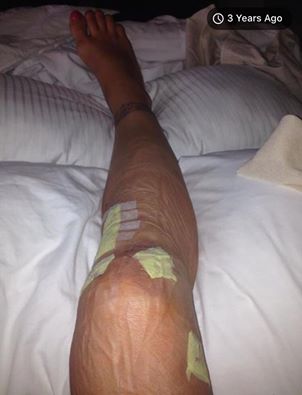
A devastating knee injury just a month after the Tate fight made a bad situation worse. It cost her a year of her career and her title shot. Soon enough, though, it was no more than an afterthought. On January 13, 2014, her estranged husband, Mauricio, committed suicide. Life as she knew it was over.
"She was a mess," Honchak said. "She didn't know which way was up. She was lost. It shocked her. I don't even know how to describe it. Her world went upside down and backwards and sideways all at the same time. She lost everything that she knew.
"When I got there, she was in a state where she still hadn't really accepted what had happened. Reality hadn't yet set in. At the same time, she had to deal with the morgue and legal issues and everything that happens when someone in your family dies."
Not knowing what else to do, Zingano turned to the only thing she hoped could see her through the storm—the consistency and structure of sport.
"At one point getting back in there and not letting the circumstances of what's happened to me define me was the goal," Zingano said. "I needed to fight one more time because I didn’t want what happened to me to be why I never get in there again."
Eight months later, she was back in the cage against fellow contender Amanda Nunes.
"Cat went through two really horrific things," strength and conditioning coach Loren Landow said. "She went through a major injury and then the unthinkable death of her husband. Just like anybody she was rattled. 'Why is this happening?' But she quickly flipped a switch that said 'I can't sit around here and feel sorry for myself. I've got to pick up the pieces and start putting things back together.'
"What she did was go back to what she knows—her training. And that allowed her to deal with the life issues she was having. As hard as it was, it helped give her the stability she was really looking for."
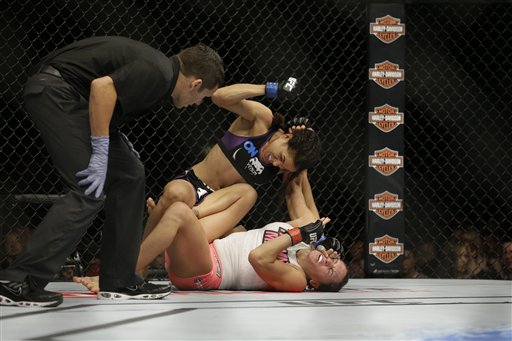
For five minutes, the quick return looked like a very bad idea. Nunes battered Zingano, at times to the point it seemed the fight might be stopped. Instead, the former top contender rallied and stopped the fight with brutal elbows in the third to maintain her undefeated record.
For the first time, she'd won a bout without Mauricio in her corner. She had proved she could see it through alone. But, in that moment of glory, she found herself looking for someone to share it with.
"Mauricio always went into the cage and lifted her up after the fight," Honchak said. "She would run to him, he would run to her, and he would lift her up...Her primary coaches went in and they didn't pick her up. I think I even yelled 'you have to lift her up.' And they didn't.
"And I could see her looking around wondering 'who is going to pick me up?' It hit her then that he wasn't there. But I think she also realized she did it without him. And she could do it without him. It was a defining moment. She could stay in the sport and fight for herself and not for him."
It was, in a strange way, a very private moment. Strangers, millions of them, watched in awe as Zingano worked through 17 months of bitterness, frustration and grief.
"Watch her expression right after they call the fight, it was a very cathartic moment for her," Landow said. "All those feelings that had built up, everything that she'd dealt with, that was a massive dump of emotions. It's not just the thrill of victory. There was something bigger there."
Mcleod agrees. The win, she says, allowed Zingano to come to grips with her loss.
"It was a huge step in healing," she said. "A lot of that emotion was her throwing it in his face, because she still had a lot of anger at that point for leaving her and Brayden. She was saying 'See? I can do this without you.'"

Zingano had gone through a year-and-a-half of hell to find herself right back where she'd started—as the top contender in the bantamweight class. But the emotional scars from Mauricio's suicide didn't scab over as easily as that. Neither, it turns out, did the beating from Nunes.
"That whole first round, I just got my head caved in," Zingano said. "I was dizzy, I couldn’t be in light for a month. I put on like 30 pounds because my pituitary gland got knocked around and my hormones were all screwed up. I had never been hit like that in a fight.
"You know, it really freaked me out because it was like, man, I am my son's only parent. If I'm all screwed up and I can't drive and I can't work and say this injury is so bad I can't fight anymore...what if I'm incapable of doing that? I can't get to the point where my brain is mush and I can barely talk, because my son's life depends on my health."
Doubts lingered—and so did a fight with Rousey for the coveted UFC title. But it was a fight with a twist. Since his father's death, Rousey had become her son's favorite fighter. The UFC champion too, it turned out, had lost a parent to suicide.
"When it happened to me and my son, I remember thinking about her later and being like, f--k, like what did her mom go through? What did she go through? That was her dad. She’s just like my son. Her mom? That’s just like me," Zingano said. "When I heard that about Ronda I was gutted for her, you know? And it was like, man, that’s why she's so tough. Because things like that will break you or they’ll make you stronger."
Driven by pride, need and a fierce confidence, Zingano took the Rousey bout despite her emotional and physical scars.
"The injury, losing my husband, losing my coach, losing my camp, my schools, my teammates...there was so much change," Zingano said. "The fight I had with Amanda left me really banged up. But UFC was ready for that fight to happen. And the way I think, I don't care that I'm hurt. I'm still gonna go win this fight despite all that. I'm stubborn like that. And I really thought I'd get through that fight and then I would take a break. I'd go win that fight, I'd be world champion and it'd be over."

It didn't work out well. In just 14 seconds, Zingano was tapping the mat. And then she disappeared from the face of the MMA map.
"I wish I had won, I wanted the win, I thought I was gonna win, but you know that’s not what happened," Zingano said. "And now that I look at it objectively, would it have been a good time for me to be a champion? I don’t think it would have, for me or my son. Do I want to be the champion? Hell, yeah. But did I have everything that it took to offer myself completely and wholly to that responsibility? Honestly, probably not."
Thailand helped. But, once again, it was Tate who inspired Zingano to find the desire to step back into active competition. Watching fights with a friend from her wrestling days, Randi Miller, Zingano realized, for the first time since the Rousey fight, that she was ready to once again do what she does best.
"Holly (Holm) and Miesha fought, and I don’t know what it was about that fight, but when I watched them fight, you know before either person won, I was just like, this is the level I'm at," Zingano said. "This is where I'm supposed to be. I want to get back in there. I want to fight these girls. I know I'm better than both of them. I know that I have everything it takes to go out and beat both of them.
"For me to fight the way I'm capable of, like I needed to be excited, I needed to want to be in there. And I feel like, for a long time, I'd lost that. I wanted to be stoked, like I wanted to have that hunger to get back in there and I was wondering and waiting if that hunger was ever gonna come back. And something about watching those fights that night, I was immediately hungry and excited."
There was just one problem. Or, more accurately, 40 problems—her weight. A professional prizefighter faces a strict allowance. And Zingano wasn't anywhere near it.
"The head injury gave me hormonal issues, which messes with your energy, messes with your weight. I got up to 175 pounds," she said. "I've never weighed that in my life. Like, when I was pregnant with a baby, nine months pregnant, I was not that heavy. You know and my whole life I've been lean and kind of jacked.
"I could eat lettuce and water and I was still not losing weight. I was feeling tired and I was feeling depressed and I couldn’t sleep, I couldn’t think right, everything was off. And I went to all these doctors in Colorado and they're looking at my blood panels and telling me 'Your hormones are all screwed up. But the stuff that you have to take to fix it are banned substances.' And that would mean that I'd need to take them and get off of them for my fights, which would bring me back to feeling like crap, and you don’t want to fight feeling like crap."

But the combination of rest, both physical and emotional, helped. So did her new team at Alliance MMA in San Diego, California, who had worked through a similar issue with another fighter. Now, with her return just a day away, Zingano is finally starting to feel like herself again.
"I never stopped training. You know I stopped fighting—when I was injured, when I lost my husband, I stopped when I needed to take the break. But I never stopped training because training is my therapy," Zingano said. "I've continued to improve. I've been training continuously just like these girls that have continued to fight. I know in the eyes of the fan, I haven't been on TV and the show went on without me. But I didn't stop working towards my goals. I never have.
"I've had this struggle with trying to figure out what's more important to me—rematching and avenging my loss to Ronda or going and getting that belt. I can't decide. But the fact that my goals are still set that high, it means I still want this.
"And that’s crazy to me and it's awesome to me. It's awesome to realize that, once again, I'm much more predator than prey."
Jonathan Snowden covers combat sports for Bleacher Report.






















